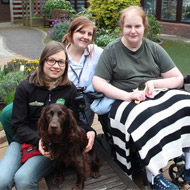
Assistance dogs to help patients with spinal injuries
A pioneering scheme that will see dogs used to aid the rehabilitation of patients with spinal injuries is set to launch at Stoke Mandeville Hospital.
In a collaborative project between Buckingham Healthcare NHS Trust and the charity Dogs for Good, specially trained dogs will be used to help patients at the National Spine Injuries centre (NSIC).
The treatment, known as Animal Assisted Intervention (AAI), is well-established in many countries but is less developed in the UK.
Through a diverse array of tools, such as throwing a ball, grooming or tugging a toy, therapists at the centre hope that patients will regain better movement in their arms and increase in confidence.
One patient set to benefit from the project is veterinary nurse Charlotte Simcock. In October 2016, Charlotte (26) suffered a spinal stroke which left her with limited movement from the chest down.
“I have a dog at home who I am really missing while I am in hospital. I can’t wait to get started on this and am so pleased I was chosen to be part of the trial,” she said. “I am sure this will really help me improve my mobility and will also help me to gain the confidence I need to get out and about once again.”
The project will research the motivational factor of the dog in engaging patients in their occupational therapy programme, the role of the dog in engaging patients in occupational therapy sessions, and the effectiveness of AAI techniques in the achievement of occupational therapy.
Dogs for Good add that the project will also look at including the patient’s wellbeing and happiness during this period and the impact on occupational therapy resources.
“This is a very exciting pilot that we have been planning for some time with Dogs for Good. The potential to help and motivate patients is huge,” commented Ruth Peachment, occupational therapy clinical specialist at the NSIC. “If the pilot is successful we are hoping to extend the scheme to help children too.”
Based in Banbury, Dogs for Good trains assistance dogs to help adults and children lead more independent lives both at home and in their local area.
“We are passionate about what can happen when we bring people and dogs together,” added Hayleigh Stimpson, AAI services development adviser at Dogs for Good. “We are keen to see how effective animal-assisted intervention techniques will be in helping patients to achieve their rehabilitation goals, and whether it will enable them to progress more quickly than anticipated.”
Image (C) Dogs for Good



 The RCVS has announced a new version of its 1CPD mobile app, with enhanced features for veterinary surgeons and veterinary nurses to record their continuing professional development.
The RCVS has announced a new version of its 1CPD mobile app, with enhanced features for veterinary surgeons and veterinary nurses to record their continuing professional development.